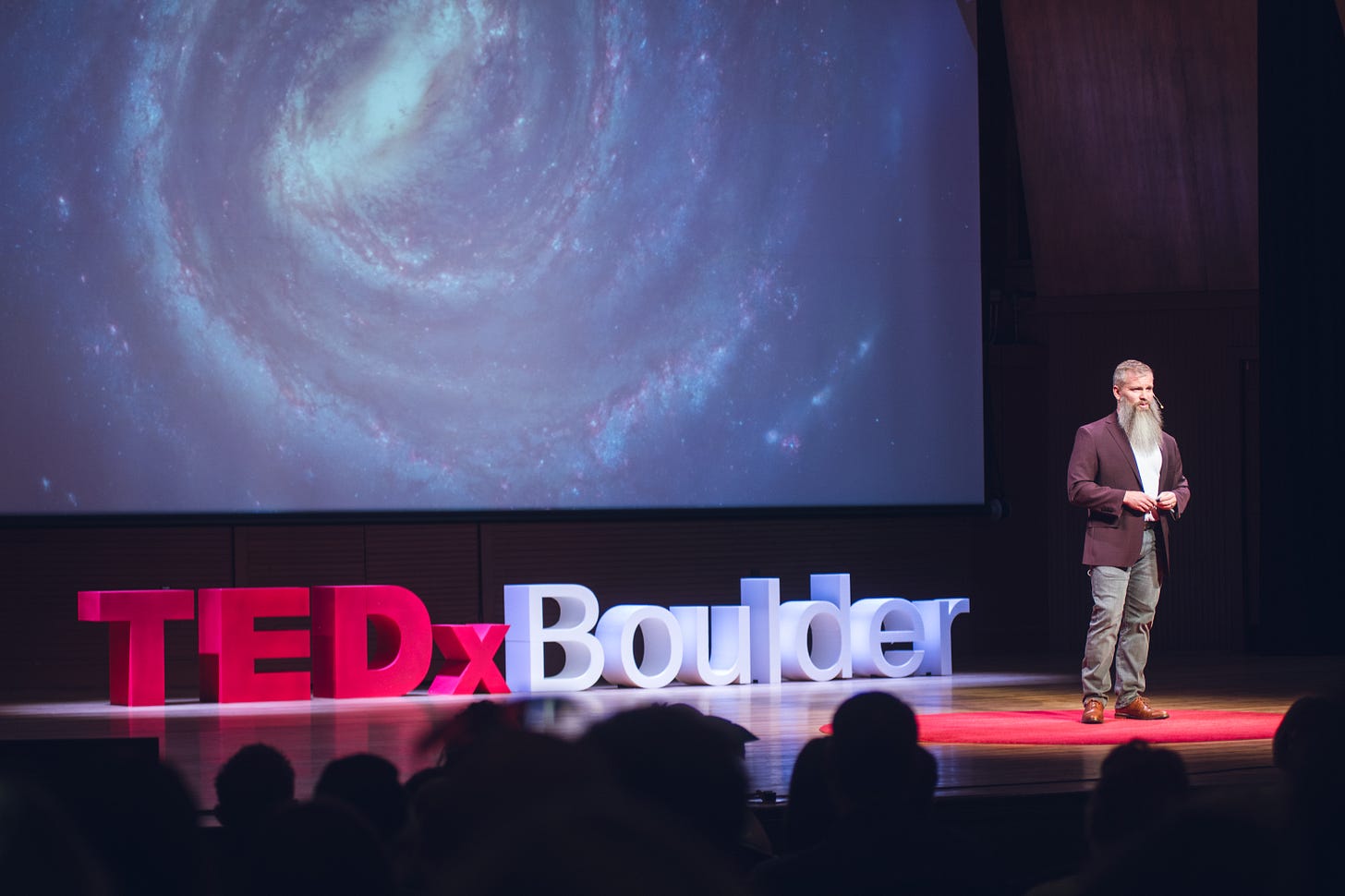The Overview Effect On Earth
You don't have to travel into space to experience what humans have been experiencing for millennia (though I'm sure it wouldn't hurt...)
In 1987, author and space philosopher Frank White coined the term The Overview Effect to describe a proposed profound psychological shift that astronauts experience when they leave Earth and look back upon it from space. This unique perspective allows them to see the planet as a fragile, interconnected whole, and to reflect on humanity's place within the biosphere. It’s a moment of awe and realization—a sense that we are part of something much larger, and that from the vantage point of space, boundaries and divisions between nations and peoples seem artificial.
Astronauts have long described this effect in their own words (in fact, it’s totally worth reading Frank White’s book “The Overview Effect: Space Exploration and Human Evolution” in its most recent edition as it includes a lot of astronaut interviews with Frank).
Edgar Mitchell, an Apollo 14 astronaut, said of seeing the Earth from the vantage point of the Moon: "You develop an instant global consciousness, a people orientation, an intense dissatisfaction with the state of the world, and a compulsion to do something about it."
The Overview Effect is not just about seeing Earth from space; it's about seeing it with new eyes—seeing the world as a singular, fragile entity in a vast and dynamic universe.
Though space travel is still limited to a very privileged few, the Overview Effect doesn't have to be.
In fact, I’ve personally found that similar feelings can arise through meditation, where I focus inwardly and outwardly, considering what it means to be and to exist within the vastness of the cosmos (and I’m certainly not alone in this personal discovery of transcendence through meditation). It’s as if by quieting the noise of daily life and our “monkey minds”, we can tap into a kind of “inner space” that offers the same expansive, awe-inspiring perspective.
As I’ve personally argued—though I know some don’t agree with me—you don’t need to leave Earth to feel the Overview Effect.
It can be accessed through meditation, virtual reality, travel, or simply reflecting on your place in the grand scheme of things. Virtual reality simulations are growing better all the time, and have even been used in assisting therapy with a VR Overview Effect. Meanwhile, meditation practices, like those in mindfulness or varying moving meditations, can expand our awareness beyond the immediate, allowing us to feel at home in the vastness of space and time both within us (we contain multitudes and are each a lineage covering billions of years of time) and outside of us (sensing beyond our immediate surroundings and “feeling” the larger cosmos beyond).
Travel and exploration can also spark this feeling. Those who have climbed mountains, swam in distant oceans, or stood before the grand constructions of human architecture—whether ancient or modern—have often experienced moments of wonder, awe, and even transcendence.
A friend of mine once described their personal experience of being at the Everest Base Camp and feeling that sense of the adventurous spirit that had led so many that far (and, for some, on toward the summit). Without even having summited the mountain, just being at the base camp and sensing a connection with climbers and explorers and sherpas, was something they described as both humbling and exhilarating, feeling not only small compared to the mountain but also profoundly connected to the long history of human achievement.
As the Hávamál, an ancient Norse text, tells us: “Only a man who is wide-traveled and has wandered far can know something about how other men think. Such a man is wise.”
Travel opens our minds and perspectives, showing us the interconnectedness of human life and the diversity of experience across the world. It exposes us to more facets of our cultural sphere and the technosphere than we could otherwise comprehend. It’s another form of the Overview Effect, reminding us that we are not isolated individuals but part of a much larger human family and a lineage of connection.
In fact, the very concept of such experiences bringing a shift in perspective and a realization of interconnectivity isn’t new at all.
Long before ancient Norse people were considering how travel impacts our understanding, the Vedas, ancient sacred texts from India, were composed with philosophies that explore the notion of unity between the deeper individual self or “higher self” (Atman) and the universal existence (Brahman). The Upanishads, part of the Vedic literature, emphasize this realization of interconnectedness as the ultimate goal of spiritual wisdom. The phrase "Tat Tvam Asi" ("You are That") is a central teaching, expressing the idea that the individual soul is one with the universal spirit.
We can likely assume that in prehistory (before written and well-transmitted human record) that shamanistic practices and early stages of religious and cultural understanding included consideration of our perspective of our existence in ways that touch on what the Overview Effect explores. From the Vedas to the teachings of the Buddha to the ancient Greek thinkers like Heraclitus and Plato and on through the millennia and centuries, many people and groups of people have come upon similar understandings of what Edgar Mitchell was quoted as saying above: a realization of connection between us all and to our world as well as a compulsion to do something to share this knowledge and make things better.
Sigmund Freud’s friend, Romain Rolland, once spoke of the "Oceanic Feeling"—the sense of boundless connection and awe that one feels when contemplating the vastness of existence. This too is a pre-echo of the Overview Effect, a reminder that even here on Earth, we can access a deep sense of wonder by contemplating the grand scale of the universe around us.

But in the rush of our daily lives, it’s easy to lose sight of these perspectives that our ancestors have been observing through our history.
We get caught up in the hubbub of work, family responsibilities, and the endless demands of modern living.
It can feel like there’s no time to reflect on our place in the cosmos, no room for awe when we’re busy with grocery lists, emails, and the day-to-day grind. Yet, our lives are incredibly brief in comparison to the vast time scales of the geological, physical, and astronomical realms. As Carl Sagan once said, “We are like butterflies who flutter for a day and think it is forever.”
The Overview Effect, from space as well as from Earth, reminds us of how small we truly are in the grand scheme of things.
It’s a humbling but also empowering realization—because once we see ourselves as part of something much bigger, we can begin to act in ways that honor that connection. Whether through personal reflection, travel, or meditation, we can each find ways to experience the Overview Effect right here on Earth.
Thinking on this very fact is what led me to the concept of The Panzoic Effect, a term I coined along with the help of Mike Toillion when thinking about the content of my recent TEDxBoulder talk. I’ll sculpt another piece about this concept soon, but suffice to say right now that The Panzoic Effect is a similar shift in perspective that comes from the sheer consideration of the possibility that we live in a universe where we are not the only lineage of biological existence: where the Earth is only one among potentially a great many inhabited worlds out there among the stars. Thinking about alien life can impact how we think of ourselves, and, as I’ve argued, it even has the potential to make us better people.

As you go about your day, take a moment to step back and reflect. You are the result of billions of years of existence, of chemical and biological selection, and of cultural and technological development. You are a luminous being. You are one way that the universe has come to know itself, and perhaps one of a great many such instances of understanding — individual and yet connected, one and yet many.
Whether you’re looking up at the night sky or simply taking a quiet moment to breathe, remember that you are part of a vast, interconnected cosmos. Imagine seeing our Earth from the outside—none of the rigamarole of our work, war, love, boundaries, beliefs, or understanding appear from out there. And from that perspective—whether seen from space or conceptualized here on Earth—all of our small problems and daily concerns seem to shrink in comparison to the beauty and wonder of existence itself.




